The intricate relationship between our gut and immune system is arguably one of the most fascinating and impactful areas of modern health research. For decades, we’ve understood that the digestive system digests food, but it’s now abundantly clear that it does so much more than simply break down nutrients. It’s a dynamic ecosystem teeming with trillions of microorganisms – bacteria, viruses, fungi, and archaea collectively known as the gut microbiota – and this microbial community profoundly influences our overall health, especially our immune function. A healthy gut isn’t just about efficient digestion; it’s about robust immunity, mental wellbeing, and even chronic disease prevention. Understanding how this system works is key to unlocking optimal health potential.
The gut isn’t a passive receiver of food but an active participant in our overall physiology. Its barrier function – the ability to selectively allow nutrients into the bloodstream while keeping harmful substances out – is paramount. This ‘gut-immune barrier’ isn’t simply a physical wall; it’s a complex interplay between the intestinal lining, the gut microbiota, and the immune cells residing within the gut. When this barrier becomes compromised—often referred to as ‘leaky gut’, although that term can be misleading and should be approached with caution – it can trigger systemic inflammation and contribute to a wide range of health issues. Supporting this vital barrier through targeted lifestyle and dietary changes is therefore crucial for maintaining long-term wellbeing. Understanding how to balance gut acidity can significantly aid in this process.
The Gut Barrier: Anatomy and Function
The gut barrier isn’t a single structure but rather a multi-layered defense system. It begins with the physical barrier formed by the intestinal epithelial cells, which are tightly connected to each other by what are known as tight junctions. These tight junctions act like gatekeepers, controlling the passage of substances across the intestinal wall. Below these cells lies a rich network of immune cells – including lymphocytes, macrophages and dendritic cells – constantly monitoring the gut environment for potential threats. This layer is crucial for distinguishing between harmless food particles and potentially dangerous pathogens. The gut microbiota itself constitutes another important component of this barrier; beneficial bacteria compete with harmful ones, producing antimicrobial substances and strengthening the intestinal lining.
The integrity of these tight junctions is critical. When they become weakened or loosened—due to factors like stress, poor diet, certain medications, or chronic inflammation—the barrier becomes more permeable. This increased permeability allows undigested food particles, toxins, and even bacteria to leak into the bloodstream, triggering an immune response. While a healthy immune system can usually handle these intrusions, constant exposure to these substances can lead to chronic low-grade inflammation which is linked to numerous health conditions including autoimmune diseases, allergies, and metabolic disorders. It’s important to reiterate that “leaky gut” isn’t currently a recognized medical diagnosis; it describes a functional impairment of the barrier, rather than a disease itself. Evaluating gut response to changes can help you understand its condition.
Maintaining a healthy gut barrier requires a balanced ecosystem within the gut. The diversity of the microbiota is considered especially important – a wider range of bacterial species typically indicates a more resilient and robust barrier function. This diversity isn’t static, however; it’s heavily influenced by our lifestyle choices, particularly diet. A diet rich in processed foods, sugar, and unhealthy fats can negatively impact microbial diversity and compromise the gut barrier, while a diet focused on whole, unprocessed foods supports its health and resilience. For those following specific diets like veganism, learning how to support digestion is key.
Dietary Strategies for Gut Barrier Support
The food we eat has a profound effect on the composition of our gut microbiota and the integrity of the gut barrier. Here are some dietary strategies to prioritize:
- Fiber Intake: Increasing fiber intake is arguably one of the most effective ways to support gut health. Fiber acts as a prebiotic, meaning it provides nourishment for beneficial bacteria in the gut. Sources include fruits, vegetables, legumes, whole grains and nuts/seeds. Aim for at least 25-30 grams of fiber per day.
- Fermented Foods: Incorporating fermented foods into your diet introduces live microorganisms (probiotics) that can help diversify the gut microbiota. Examples include yogurt (with live cultures), kefir, sauerkraut, kimchi, kombucha and miso. It’s important to note that not all fermented foods are created equal – look for products with active cultures and minimal added sugar.
- Polyphenol-Rich Foods: Polyphenols are plant compounds with antioxidant and anti-inflammatory properties that can benefit gut health. These are found in abundance in berries, dark chocolate (70% cacao or higher), green tea, grapes, and apples.
A practical approach to improving your diet for gut health involves a gradual transition. Don’t try to overhaul your entire eating pattern overnight; instead, start by adding one new source of fiber or fermented food each week. Pay attention to how your body responds and adjust accordingly. Reducing intake of processed foods, sugar, and artificial sweeteners is also crucial, as these can disrupt the delicate balance of the gut microbiota. How motion sickness can impact your digestive system is also worth considering, as it often leads to nausea and discomfort.
Stress Management and Gut Health
The connection between our mind and gut—often referred to as the gut-brain axis—is bidirectional: what happens in the brain affects the gut, and vice versa. Chronic stress has a significant impact on gut health, disrupting the gut microbiota, increasing intestinal permeability, and suppressing immune function. When we experience stress, our bodies release cortisol, a hormone that can negatively affect gut barrier integrity and microbial balance. Prolonged elevated cortisol levels lead to inflammation and potentially compromise the entire gut-immune system.
Implementing effective stress management techniques is therefore essential for supporting a healthy gut. Some effective strategies include:
- Mindfulness & Meditation: Regular mindfulness practice has been shown to reduce stress, improve mood, and positively impact gut health. Even 10-15 minutes of daily meditation can make a difference.
- Regular Exercise: Physical activity is a powerful stress reliever and also promotes microbial diversity in the gut. Aim for at least 30 minutes of moderate-intensity exercise most days of the week.
- Adequate Sleep: Sleep deprivation disrupts cortisol levels, increases inflammation, and negatively impacts gut health. Prioritize getting 7-9 hours of quality sleep each night.
It’s important to find stress management techniques that work for you personally. Experiment with different methods—yoga, deep breathing exercises, spending time in nature, journaling – until you discover what helps you feel calm and centered. Addressing the root causes of stress is also crucial; this may involve setting boundaries, simplifying your schedule, or seeking professional support if needed.
The Role of Specific Nutrients
Beyond general dietary patterns, certain nutrients play a particularly important role in supporting gut barrier function. Glutamine, an amino acid, is essential for the health and repair of intestinal cells. While our bodies can produce glutamine, supplementation may be beneficial during periods of stress or illness. Similarly, zinc is vital for maintaining the integrity of the intestinal lining and supporting immune function within the gut. Deficiencies in zinc are linked to increased intestinal permeability.
- Omega-3 Fatty Acids: Found in fatty fish, flaxseeds, and chia seeds, omega-3 fatty acids have anti-inflammatory properties that can help reduce gut inflammation and improve barrier function.
- Vitamin D: Often referred to as the “sunshine vitamin,” Vitamin D plays a crucial role in immune regulation and may help strengthen the gut barrier. Many people are deficient in Vitamin D, especially during winter months, so supplementation may be beneficial (consult with a healthcare professional before supplementing).
It’s important to obtain these nutrients primarily through whole foods whenever possible. Supplementation should only be considered under the guidance of a healthcare professional, as excessive intake of certain nutrients can have adverse effects. A well-rounded diet, coupled with effective stress management and regular physical activity, forms the foundation for a healthy gut-immune barrier and overall wellbeing. Remember that this is an ongoing process; consistency and mindful attention to your body’s needs are key to long-term success. Understanding gut testing can also provide valuable insights into your gut health status, helping you tailor your approach for optimal results and evaluating gut response is crucial to see if changes are effective. Also, remember that sometimes nausea without cause may be a symptom of deeper issues.


















